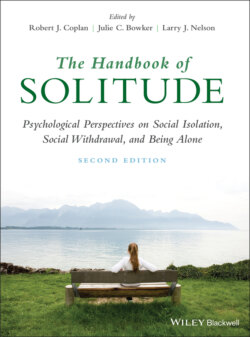Читать книгу The Handbook of Solitude - Группа авторов - Страница 80
Exploring Culture and Shyness from a Contextual‐Developmental Perspective
ОглавлениеAccording to Hinde (1987), whereas social interactions and relationships play an important role in shaping individual development by providing an organizing context for children and adolescents to learn and display socially appropriate behaviors, the process of social interactions and the organization of social relationships are guided by cultural values and norms. This view is consistent with Vygotsky’s cultural‐historical theory (1978), which asserts that sociocultural conditions in the society are the foundation for learning and modification of mental processes and that social practices or activities of human beings are a primary mediator of cultural influence on individual development. Largely based on Hinde’s view (1987) and Vygotsky’s theory (1978), Chen and colleagues (e.g., Chen, 2012; Chen & French, 2008) propose a contextual‐developmental perspective focusing on the role of social interactions in linking cultural values and individual functioning. According to this perspective, adaptive and maladaptive behaviors need to be understood and examined in the context of social interactions and relationships and from a developmental point of view. Specifically, when children display behaviors in social interactions, adults and peers evaluate the behaviors according to cultural norms and values. At the same time, adults and peers respond to the behaviors by expressing their attitudes (e.g., acceptance, rejection) toward the children. Social evaluations and responses in interactions and attitudinal/emotional processes in relationships serve to regulate the development of the behaviors. Specifically, positive evaluations and responses may reinforce the behaviors, whereas negative evaluations place pressure on the children to control or modify the behaviors. Moreover, social approval and encouragement help children develop positive self‐regard and self‐feelings. In contrast, social disapproval and rejection may elicit anger and distress, especially if children are unable or unwilling to control the behaviors. The negative emotional reactions are likely to result in externalizing problems if they are directed toward others or internalizing problems if they are directed toward the self (Chen, 2020; Chen & Liu, 2016). In the section that follows, we discuss children’s shyness from the contextual‐developmental perspective.
